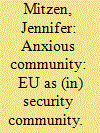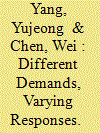| Srl | Item |
| 1 |
ID:
160621


|
|
|
|
|
| Summary/Abstract |
From the Eurocrisis to the migration crisis, and from Brexit to a strengthening far right, the European Union (EU) faces multiple stressors. But while crises unleash anxiety, they do not necessarily portend the worst: because they disrupt old routines, crises can open space for new political possibilities. As a self-consciously hybrid, ‘post-national’ political form, the EU would seem poised to take advantage. Instead it is stuck. In this paper, taking an ontological security approach and focusing on EU migration governance, I propose that one cause of paralysis could lie – ironically – in an aspect of the EU that is crucial to its normative power: Europe’s long peace. An ontological security perspective highlights the management of existential anxiety as crucial to identity, suggesting how different modes of anxiety management have different political effects. Applied here, EU narratives and routines preserving ‘no war’ might suppress relations of structural power; they might mimic primitive defense mechanisms; or they might be symptoms pointing to unconscious processes keeping difficult knowledge – including colonial pasts – undealt with. I suggest how migration governance might manifest these mechanisms, contributing to the difficulties of desecuritising migration and linking its governance to EU values and institutions.
|
|
|
|
|
|
|
|
|
|
|
|
|
|
|
|
| 2 |
ID:
175569


|
|
|
|
|
| Summary/Abstract |
While Chinese local governments remain extremely wary of workers’ collective actions, they do not always suppress them; sometimes, they tolerate such actions and even seek to placate workers. What accounts for these different government responses to workers’ collective actions? Based on a sample of over 1,491 collective action cases that took place in Guangdong between 2011 and 2016, we find that the types of demands raised by workers during collective actions affect how local governments respond. Local governments are likely to forcefully intervene in collective actions in which workers make defensive claims concerning issues of payment. In contrast, local governments are likely to use non-forceful approaches in response to actions in which workers make defensive claims regarding social security.
|
|
|
|
|
|
|
|
|
|
|
|
|
|
|
|